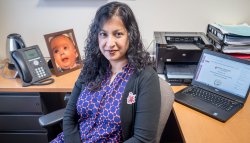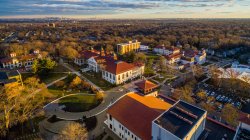When the Research Is Personal
Like any researcher, Assistant Professor of Nutrition and Food Studies Mousumi Bose was thrilled to receive an extension of a National Institutes of Health– funded training grant from the Sterol and Isoprenoid Research (STAIR) Consortium of the Rare Diseases Clinical Research Network.
Unlike most researchers, however, Bose uses her work to celebrate the life of a son she lost far too soon.
Bose was a postdoctoral fellow at Columbia University when she became pregnant with her first son, Ilan, who was born in August 2010 with Zellweger Spectrum Disorder (ZSD), a rare metabolic illness that affects one in 50,000 children.
Bose was 37 weeks pregnant with her second son, Etash, when Ilan died. “Ilan had round-the-clock seizures, low muscle tone and was constantly on oxygen,” she says. “I didn’t know how long he would be with us, so I quit my job and cared for him. He passed away in October 2011.”
“I have the opportunity to contribute to a better understanding of these kids and make a difference for every family touched by ZSD.”
Before Ilan was born, she had specialized in the effects of gastric-bypass surgery, but things began to change after she joined an organization for families affected by ZSD, an often fatal peroxisome biogenesis disorder that prevents children from metabolizing specific types of fats.
“I got involved in advocacy for ZSD,” Bose says. “I joined the Global Foundation for Peroxisomal Disorders board when the secret got out that I had a science background. So I helped establish foundation-funded grant opportunities for researchers and facilitated getting scientists together to study this rare disease.”

In 2016, Bose became a full-time professor at Montclair State and “realized that I could make a difference by committing myself to working on ZSD research.” The NIH grant allows her to contribute to the research goals of STAIR by investigating rare diseases of sterol metabolism, including nutritional aspects of the peroxisome biogenesis disorders.
“Now that I am into the second phase of this work, thanks to the rare-disease training grant, it gives me the freedom to teach my classes, conduct research and build connections with other foundations in the STAIR consortium,” Bose says.
The Rare Diseases Act of 2002 led to the creation of the Rare Diseases Clinical Research Network, a group of consortia (including STAIR) that allows researchers to connect with patients and families that, while not large in number, represent a global issue. At present, rare diseases affect about 60 million people in the United States and Europe combined.
“I had started my research with 30 to 40 families,” Bose says, but “this grant allows me to get more families involved in the studies.”
Through it all, Bose has had her husband, Andrew, and children — Etash, now 6, and Kiran, 3 — to lean on, which gives her a rare perspective and desire to make a difference.
“I am not happy that our family went through what we went through,” says Bose, “but because of that experience and my background in science, I have the opportunity to contribute to a better understanding of these kids and make a difference for every family touched by ZSD.”
